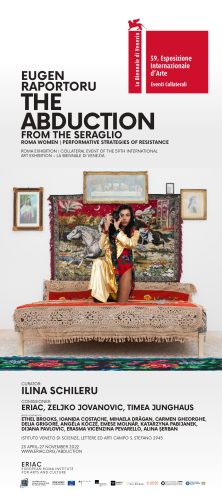Roma Women – Performative Strategies of Resistance

Alina Şerban. Photo: Ilina Schileru
The European Roma Institute for Arts and Culture (ERIAC) is proud to present Eugen Raportoru: The Abduction from the Seraglio, accompanied by Roma Women: Performative Strategies of Resistance, an official collateral event at the 59th International Art Exhibition, curated by Ilina Schileru. In the long history of La Biennale, this is only the fourth occasion when a presence of Roma art is ensured, and the second time when ERIAC is commissioner of the collateral Roma event. This solo show of an artist of Roma origin, presented in collaboration with a group of Roma women artists and intellectuals reflecting upon, questioning and offering alternative perspectives on the main theme ofThe Abduction, represents a new milestone in European art history and an achievement of the vibrant European Roma cultural movement.
Please find the biographies of the participants in Roma Women: Performative Strategies of Resistance programming below.
ETHEL BROOKS | SCHOLAR
Ethel Brooks is Chair of Women’s, Gender, and Sexuality Studies and Associate Professor of Women’s, Gender and Sexuality Studies and Sociology at Rutgers University. Brooks is a Tate-TrAIN Transnational Fellow at the University of the Arts London, where, in 2011-2012, she was the US-UK Fulbright Distinguished Chair. Brooks was appointed under President Obama to the United States Holocaust Memorial Council, where she served from 2015-2020. She is Chair of the Board of the European Roma Rights Centre and member of the Bavarlipe Academy of the European Roma Institute for Arts and Culture, the RomaMoMA Think Tank, and the US Delegation to the IHRA and its Roma Genocide Working Group. Since 2007, she is co-Director of the annual Feminist Critical Analysis course in Dubrovnik, Croatia. Brooks is the author of the award-winning Unraveling the Garment Industry: Transnational Organizing and Women’s Work. Her current book project focuses on encampment, claim-staking, and Romani futures.
IOANIDA COSTACHE | ETHNOMUSICOLOGIST
Dr Ioanida Costache is a Romani violinist, filmmaker, writer and scholar. Costache completed a PhD in ethnomusicology at Stanford University. Her scholarship on Romani musico-oral traditions seeks to make audible the counter-histories embedded in the emotive, performative practices of Romani artists. Broadly, her work investigates the intersections of race, the performance/construction of identity, cultural memory, trauma, and history as they intersect in Romani musico-oral traditions and contemporary artistic practices. She traces the legacies and afterlives of Romani history, as well as de-colonial critiques of the present. Her writing has been published in EuropeNow, RevistaARTA, Critical Romani Studies, Bridge Magazine, Barricade and Decat o Revista. She is the co-author of a children’s book about Romani history released in 2022. Costache is a two-time Fulbright grantee, currently based in Bucharest, Romania.

MIHAELA DRĂGAN | MULTIDISCIPLINARY ARTIST
Mihaela Drăgan is a multidisciplinary artist with an education in theatre, living and working in Bucharest and Berlin. In 2014, she founded Giuvlipen Theatre Company. Over the past few years, she has appeared in Berlin as an actress for Maxim Gorki Theatre, Heimathafen Neukölln, and Theatre Aufbau Kreuzberg. She was one of six finalists of the 2017 Gilder/Coigney International Theatre Award New York, which acknowledges the exceptional work of 20 women in theatre worldwide. In 2018, Drăgan was a resident artist in Hong Kong at Para Site Contemporary Art Centre, where she developed the concept of Roma Futurism, situated at the intersection of Roma culture, technology and witchcraft. The same year, she was acknowledged by PEN World Voices International Festival in New York as one of the ten most respected dramatists of the world. In 2019, she was selected for the acclaimed Royal Court Theatre International Summer Residency in London, where she wrote a science-fiction play on a future utopian society of Roma witches who control technology and fight neo-fascist politics in Europe. The performance Roma Futurism was showcased in the Museum of Contemporary Art in Belgrade and at FutuRoma – collateral exhibition at the 58th Venice Biennale. Her first video installation, Future is a safe place hidden in my braids, was shown in 2021, depicting futuristic rituals to heal the trans-generational trauma of the Roma and projecting a safe future for the community.
DELIA GRIGORE | WRITER
Delia Grigore is a Roma writer, researcher and activist from Romania, with a PhD in visual arts from the Institute of Ethnography and Folklore of the Romanian Academy. She serves as President of the association Rroma Centre “Amare Rromentza”, and has been working in the Roma movement for more than two decades. An author of three books and numerous articles and studies on Romani culture and literature, she edited Rromane Dikhimata (Rromane Perspectives): Anthology of Rromani Literary Creation in 2018. A poet and writer, Grigore is a lecturer at the University of Bucharest, Faculty of Foreign Languages and Literatures, Rromani Language and Literature Section, and also member of the Writers Society “Costache Negri” in Romania.
ANGÉLA KÓCZÉ | SOCIOLOGIST
Angéla Kóczé, sociologist, Chair of Romani Studies, and Academic Director of the Roma Graduate Preparation Program at Central European University (CEU) in Budapest, Hungary. In 2013-17, she was a Visiting Assistant Professor in the Department of Sociology and Women’s, Gender and Sexuality Studies Program at Wake Forest University in Winston Salem, NC, USA. She has published several peer-reviewed articles and book chapters with various international presses, including Palgrave Macmillan, Ashgate, Routledge and CEU Press, as well as thematic policy papers related to social inclusion, gender equality, social justice and civil society. In 2013, the Woodrow Wilson International Center for Scholars in Washington, DC honoured Kóczé with the Ion Ratiu Democracy Award for her interdisciplinary research approach, which combines community engagement and policymaking with in-depth participatory research about the Roma. She is co-editor of The Romani Women’s Movement: Struggles and Debates in Central and Eastern Europe (Routledge, 2019, with Violetta Zentai, Jelena Jovanović and Enikő Vincze), and The Roma and their Struggle for Identity in Contemporary Europe (Oxford: Berghahn, 2020, with Huub van Baar).
DIJANA PAVLOVIC | ACTIVIST, POLITICIAN
Dijana Pavlović is a naturalised-Italian Serbian actress, activist and politician. Born in Kruševac (Serbia), she graduated from the Faculty of Dramatic Arts at the University of Belgrade. Between 1995-99, she participated in many international theatre festivals in the former Yugoslavia, Romania and Bulgaria. In 2000, she was the translator and interpreter for the show, Sentiero color cenere, which refers to unpublished poetry and prose belonging to Roma culture. In 1999-2000 she acted in Italian, in theatrical productions in schools, including the fable, The Ugly Duckling, and Moliere’s Il tartufo and Il medico per forza. Over the years, Pavlović has promoted the culture and literature of the Roma, as well as playing the role of cultural mediator in schools. She was nominated for the City Council of Milan in 2006, on the United list with Dario Fo, and for the Italian Parliament in 2008 in the ranks of La Sinistra l’Arcobaleno; though she was not elected.
ERASMA VICENZINA PEVARELLO | ACTIVIST
Erasma Vicenzina Pevarello is a Romani Sinti activist born in Poiana Maggiore, Italy in 1927, whose story is told by Irene Rui in the book, Erasma, Vicenzina, Pevarello, Story of an Italian Sinti Woman (2012). Her husband, Renato Mastini “Zulin”, was one of the ten martyrs of Vicenza killed on 11 November 1944 after the attack on the Ponte dei Marmi. Four of them, including Mastini, were Sinti. Through her personal narrative, Pevarello teaches about trauma and healing, hope and resistance.
ALINA ȘERBAN | ACTRESS
Alina Şerban is an award-winning Roma actress, playwright, director and ARTivist, living and working in Bucharest and London. As a playwright, she is among the pioneers of Roma feminist political theatre and is known for writing and performing plays on social justice, tackling sexism, racism, homophobia and various other forms of discrimination. She studied at the National University of Theatre and Film in Bucharest, Tisch School of the Arts in New York, and the Royal Academy of Dramatic Art in London. In 2016, she researched, penned, directed, and starred in Romania’s first play about Roma slavery, a taboo topic still not included in the country’s textbooks. Şerban won the Best Actress Award at the German Actors Guild Awards in 2020 for her role in Gypsy Queen, was nominated for Best Actress of the German Film Award 2020, and represented Romania at the Cannes International Film Festival 2018 for her leading role in Alone at My Wedding. In 2021, Şerban became the first Roma Director at Bucharest National Theatre with the play, The Best Child in the World.

[…] Next Blog Entry […]